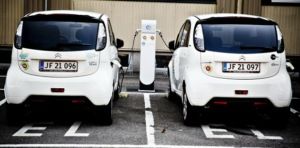News
Danish News in Brief: Electric car charging pods outnumber petrol stations in Denmark
This article is more than 8 years old.
In other news, it has been a rotten year for Danish fruit and a Danish Jehovah Witness arrested in Russia could face 10 years

The number of electric and hybrid cars in the country more than doubled from 2020 to 2021 (photo: Dansk Energi)
There are now more electric car charging docks in Denmark than there are traditional petrol stations, according to a new report from the Danish energy association, Dansk Energi.
The report showed there are 2,030 publicly-accessible electric car docking stations in Denmark – two more than the 2,028 petrol stations spread across the country.
But despite the infrastructure for electric cars falling into place, the government’s decision to bring back the registration tax for electric cars last year continues to impact sales.
So far in 2017, only 182 electric cars have been sold in Denmark overall, and just 17 of those sales have been to private consumers – a steep decline from the 4,605 sold in 2015.
More time for crime
People being convicted for certain crimes in Copenhagen can expect to spend more time behind bars than was the case previously, according to new figures from the national statistics keeper, Danmarks Statistisk. In 2007, the average stint in prison for committing a violent crime was 4.8 months, but last year the same crime had an average prison sentence of 7.4 months. Sentences for threats, burglaries and sexual crimes have also increased since 2007.
Frosty fruit reception
Fruit growers across Denmark are experiencing what some are calling the worst damages to apple production in 25 years thanks to the spring frost that hit the nation this year. Due to the frost that returned to Denmark this spring following a warm patch, fruit growers have endured damages with a severity that hasn’t been seen since 1991. A night with frost on April 19 froze off many of the flower buds on apple trees in Denmark. The production of pears and berries has also been impacted.
Danish Jehovah Witness looking could face ten years
Dennis Christensen, the Danish Jehovah Witness who became the first foreigner to be arrested in Russia in conjunction with the nation’s new ban on the religious organisation, faces ten years behind bars if found guilty. Christensen was apprehended by the Russian authorities in the town of Oryol in May after the Supreme Court banned the religions and identified its followers as religious extremists. Last week, that ruling was upheld by the nation’s high court.
Christiania drowning
A Swedish man drowned yesterday evening after entering the water at Stabsgraven just behind Nemoland in Christiania. Witnesses saw the man, who was in his mid-40s, enter the water but fail to return. He was eventually brought back to land and given CPR treatment, but unfortunately his life could not be saved. Police are not treating the man’s death as a crime at this time.










































